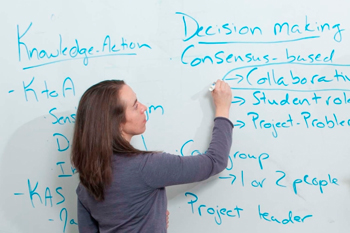Knowledge to Action
![]()
Knowledge-to-Action Team and Sustainability Behavior Team
Institution: University of Maine
Sponsor: National Science Foundation through the Sustainability Solutions Initiative
Maine’s universities and colleges produce knowledge that can help communities solve sustainability challenges, but oftentimes, this knowledge isn’t used. SSI’s Knowledge to Action (K?A) Collaborative at the University of Maine is studying ways to better align university research with community needs and improve collaboration between researchers and stakeholders on key sustainability challenges throughout the state.
Why This Project?
Communities in Maine and around the world are contending with increasingly complex sustainability problems at the intersection of economic, social, and environmental issues. Yet these communities are often disconnected from academic institutions, which could conduct and share research to help them solve these problems. As a result, a “mismatch” often exists between the kind of information communities need and the research academic institutions produce.
Connecting Knowledge with Action
 The K-A Collaborative is investigating ways to overcome the barriers between knowledge and action and build partnerships between Maine’s academic institutions and diverse stakeholders in order to better solve sustainability challenges throughout the state.
The K-A Collaborative is investigating ways to overcome the barriers between knowledge and action and build partnerships between Maine’s academic institutions and diverse stakeholders in order to better solve sustainability challenges throughout the state.
Team members are combining surveys, modeling, and other research methods to study individual behavior and institutional behavior and collaboration. Their project integrates three strands of research. The first strand focuses on understanding how to improve collaboration across researchers and stakeholders by examining factors that influence participation in partnerships. The second strand examines how communication about science and the use of scientific practices such as modeling affect decision making, and will investigate these questions within the context of renewable energy, vernal pools, water quality management and conservation planning. The third strand of research identifies and evaluates opportunities for developing a statewide network to promote stakeholder-university partnerships addressing key sustainability challenges.
The team’s findings will shed light on the most effective ways to improve collaboration between the state’s academic institutions and communities in order to produce knowledge that community leaders, policy makers, and citizens can use to solve urgent sustainability challenges. In addition, this research will advance the field of sustainability science by developing a model of K-A processes that can be used and adapted in other settings.
Knowledge to Action Team leaders:
- Laura Lindenfeld, Communication & Journalism, Margaret Chase Smith Policy Center
- Linda Silka, Margaret Chase Smith Policy Center
Sustainability Behavior Team Leaders:
- Mario Teisl, School of Economics
- Caroline Noblet, School of Economics
- Shannon McCoy, Dept. of Psychology
- Mark Anderson, School of Economics
Resources:
- News: Communication Affects Research Outcomes
- News: Sustainable Science Partnerships – Belief is the First Step
- News: A New Take on Measuring Environmental Views
- News: SSI Researchers Co-Author Article on Community Engagement
- Publications
- McGreavy, B., L. Lindenfeld, K. Hutchins, L. Silka, J. Leahy, and B. Zoellick. 2015. Communication and sustainability science teams as complex systems. Ecology and Society 20(1): 2.
- Noblet, Caroline L., Anderson, M., & Teisl, M. F. (2013). An empirical test of anchoring the NEP scale in environmental ethics. Environmental Education Research, 19(4), 540–551. doi:10.1080/13504622.2012.704899
- Damon M. Hall, Linda Silka, Laura Lindenfeld. 2012. Advancing Science and Improving Quality of Place: Linking Knowledge with Action in Maine’s Sustainability Solutions Initiative. Maine Policy Review (Vol. 21, No.1).
- Karen Hutchins, Eric Conrad. 2012. Building Statewide Community-University Partnerships: Working with the Maine Municipal Association. Maine Policy Review (Vol. 21, No. 1).
- Lindenfeld, L.A., D.M. Hall, B. McGreavy, L. Silka, D. Hart. 2012. Creating a place for Communication Research in Sustainability Science. Environmental Communication: A Journal of Nature & Culture. Volume 6 (March), pp. 23-43.
- Silka, L. Community Research in Other Contexts: Learning from Sustainability Science. Journal of Empirical Research on Human Research Ethics, 5(4), 3-11.
- Budzinski, C., L. Lindenfeld, L. Silka. 2011. Sustainability Solutions Initiative Partners Technical Report. University of Maine. 34 pages.
Supported by National Science Foundation award EPS-0904155 to Maine EPSCoR at the University of Maine.
